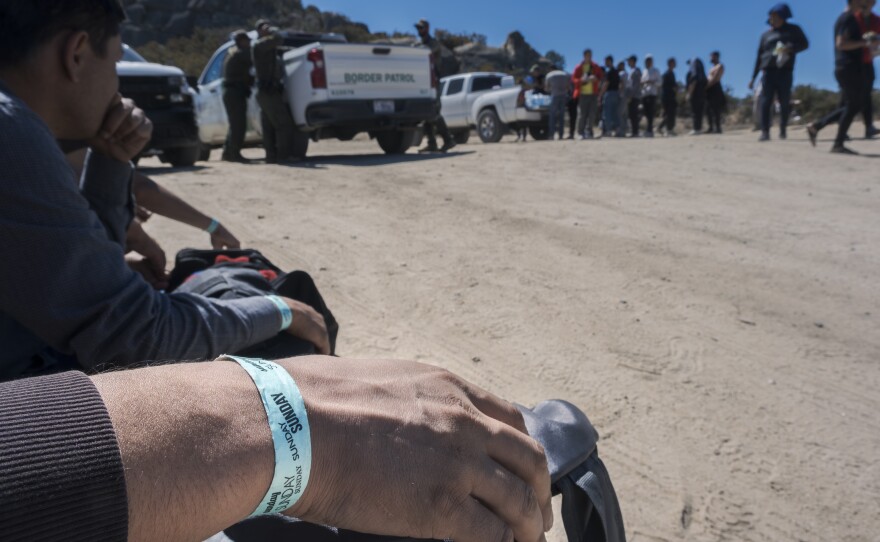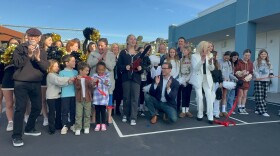
U.S. Customs and Border Protection officers are holding groups of migrants 70 miles east of San Diego to wait for their asylum claims to be processed off a dirt road in the desert near Jacumba Hot Springs, according to the mutual aid group Border Kindness.

The Sunrise Powerlink’s massive overhead power lines buzzed overhead as two Kurdish migrants sheltered under the desert’s chaparral brush.
“You don't have anything to help you,” said Victoria Vazquez, a water drop route leader with Border Kindness. “There’s absolutely nothing.”
KPBS could not confirm where the migrants are crossing the border. A spokesperson from Border Kindness said some are walking across the border where there is no border wall nearby the makeshift camp. After making contact with border patrol officers, they are directed to wait for their asylum claim to be processed.
The group has been providing food, water and clothing to migrants here in the desert since Saturday morning,
“We’ve brought over, I want to say, a thousand sandwiches, a thousand water bottles,” she said.

In addition to Kurdish migrants, there are Chinese, Cuban, Colombian, Brazilian and Russian asylum-seekers waiting in the desert for days.
Vazquez said the migrants were dropped off with nothing and left to create their own shelter. The daytime temperatures here hover around 90 degrees, dipping to the low 50s overnight.

Brazilian migrant Adrian Garcia Fejeda said he hoped to meet up with his wife in New York and find work.
Six friends from Cuba want to go to Chicago.

At around noon, a CBP officer picked up about a dozen of the migrants, including women and children who said they had been waiting for about a day, and six men who had been there since Sunday.

“A lot of the people are being stranded here for days — we’ve had people that are here since Sunday,” Vazquez said. “So it is a dire situation when it comes down to people dumped out in the middle of the desert and being left alone, and being stranded and really no other help besides regular people.”
After KPBS published this story, a spokesperson from U.S. Customs and Border Protection emailed a prepared statement.
“We remain vigilant and expect to see migration fluctuations, knowing that smugglers continue to use misinformation to prey on vulnerable individuals. CBP is executing our operational plans and working to decompress areas along the southwest border. We are safely and efficiently vetting and processing migrants to place them in immigration enforcement proceedings consistent with our laws and operational planning efforts. Those without a legal basis to stay will be processed for removal and face consequences that include a minimum five-year bar on re-entry, loss of eligibility to access lawful pathways, and prosecution for repeat offenders,” the statement said.
CBP did not directly respond to questions about where the migrants were crossing the border, how they were arriving in Jacumba or where they were from, and declined an interview.
Editor's Note: A previous version of this story said U.S. Customs and Border Protection officers are driving groups of migrants 70 miles east of San Diego to wait for their asylum claims to be processed. After the story published, a source told KPBS she misspoke about where the migrants were crossing the border. The story has been updated to reflect that the migrants are being held at this location. We regret the error.






